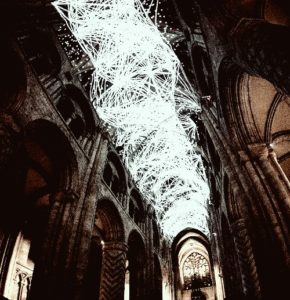 Advice to a Prophet
Advice to a Prophet
by Richard Wilbur
When you come, as you soon must, to the streets of our city,
Mad-eyed from stating the obvious,
Not proclaiming our fall but begging us
In God’s name to have self-pity,
Spare us all word of the weapons, their force and range,
The long numbers that rocket the mind;
Our slow, unreckoning hearts will be left behind,
Unable to fear what is too strange.
Nor shall you scare us with talk of the death of the race.
How should we dream of this place without us?–
The sun mere fire, the leaves untroubled about us,
A stone look on the stone’s face?
Speak of the world’s own change. Though we cannot conceive
Of an undreamt thing, we know to our cost
How the dreamt cloud crumbles, the vines are blackened by frost,
How the view alters. We could believe,
If you told us so, that the white-tailed deer will slip
Into perfect shade, grown perfectly shy,
The lark avoid the reaches of our eye,
The jack-pine lose its knuckled grip
On the cold ledge, and every torrent burn
As Xanthus once, its gliding trout
Stunned in a twinkling. What should we be without
The dolphin’s arc, the dove’s return,
These things in which we have seen ourselves and spoken?
Ask us, prophet, how we shall call
Our natures forth when that live tongue is all
Dispelled, that glass obscured or broken
In which we have said the rose of our love and the clean
Horse of our courage, in which beheld
The singing locust of the soul unshelled,
And all we mean or wish to mean.
Ask us, ask us whether with the worldless rose
Our hearts shall fail us; come demanding
Whether there shall be lofty or long standing
When the bronze annals of the oak-tree close.
[su_quote cite=”Nostradamus. century: 1, quatrain: 11 “]So. Was It Divine Inspiration? The motion of senses, heart, feet and hands will be in agreement between Naples, Lyon and Sicily. Swords fire, floods, then the noble Romans drowned, killed or dead because of a weak brain.[/su_quote]
[su_quote cite=”Nostradamus. century: 1, quatrain: 62”]Alas! what a great loss there will be to learning before the cycle of the Moon is completed. Fire, great floods, by more ignorant rulers; how long the centuries until it is seen to be restored.[/su_quote]
Or Just Inspired Poetry?
Chapter 31 of Jeremiah, in which the Lord comforts Rachel
…these are the Lord’s words:
your voice will cease its weeping
your eyes brighten behind the tears
that dissolve into crystal-clear vision
of the children alive
returning home
from the lands of enemies
from beyond anguish to hope revived
vision is your reward
there is new life for your labor, remembrance
in the presence of children, eyes wide open
turning to the future
that is also yours
within the borders of a reality
and beyond them your descendants
are walking freely
by the strength of an unfailing imagination
an unbroken integrity
a listening dedicated
to the words that bade them live.
Here Are Some Of The Poets Considered Prophets: Blake, Wordsworth, Nostradamus, Gibran Jeremiah, Ezekiel & Leonard Cohen,Dylan, Bacon And Milton too,all these poets were prophets true?
“Maybe”
But were they? Did they have some form of secret knowledge or hidden divine spark? Were, are they dead.. or the living prophets of our times?
Poets throughout the centuries have adopted the voice of the prophet, seizing upon its authority and providing the reader with an instant frame of reference that assigns layers of meaning to their words. But in the beginning–before the poet was prophet–the prophet was poet. Ezekiel, whom we read this Sabbath, was perhaps the quintessential poetic prophet. He provides in his prophecy his own take on the history of the Jewish nation: It begins with the exile, to which he bears witness, and culminates in the people’s restored glory in the Land of Israel. In this way, the Book of Ezekiel is generally understood as comprising two parts: God’s rebuke, followed by God’s consolation. But in the following passage, rebuke and consolation mingle with subtlety and beauty: “And I shall give you a new heart and a new spirit shall I put within you; I shall remove the heart of stone from your flesh and give you a heart of flesh. And my spirit I shall put within you that shall cause you to go by my decrees and you shall dwell in the land that I gave your fathers; and you shall be to Me a people and I shall be your God” [vv. 26-29]. Here, God promises to alter the moral makeup of His people–to create them anew–in order for them not to sin in the future.
The poetic strength of Ezekiel lies in its allegory–a poetic device that barely surfaces in the undeviating narrative prose of the Five Books of Moses–and its intertextuality.
And Today?
“In every Arab country every day, poets appear on television, on the radio, or in the newspaper. Every single newspaper in the Arab world every day has poetry.
So in America, why don’t we?
In Al-Basrah a town in Iraq, poets gather every year for a poetry festival, just as they did 14 centuries ago. And in Cairo each Friday, people come together at the shrine of Ibn al-Farid, a 13th century Sufi poet, to hear his poems read. And in Yemen, poetry is still vital for negotiating and settling tribal disputes.
So in America? Why can’t we?
Because, in Arab culture, there is an affinity for poetic language which is deeply rooted. And historically, the poet has held a position of high esteem. “The Arab poet was the voice of his tribe, its defender and representative – above all, its provocative force,” The tribes took their name from the camel-herding Bedouins who called themselves ‘arab, or people from the land of Arbi in the Syrian desert.
Nomadic tribes relied on poets to recount news and offer political commentary, and to keep an oral record of tribal history – triumphs, defeats, marriages, and deaths were recorded in verse. “The poem itself reflects the history of the tribe – the principles, the values, the customs, the traditions,“You want to know anything about the Arabic people – about their history, tradition, genealogy, battles, love affairs – you turn to poetry.
Poems were also used to convey messages, as in this 6th-century poem by Al-Muraqqish.
O camel-rider, whoever thou mayst
be, bear this message, if thou lightest on
them, to Anas son of Sa’d, and ‘Harmalah:
‘Great will be the virtue of you twain
and your father, if the man of Ghufailah
escapes being slain!’
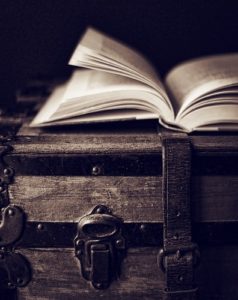 “There is an incredibly rich tradition of poetry from the pre-Islamic period, with many different topics and genres: panegyrics, love poems, elegies, eulogies. There is a shorter poem of occasion, an elegy, for example, on the death of a hero—a genre in which women poets were particularly strong. And then a much more elaborate polythematic poem, a liturgy involving many different sections: a tribal celebration called a qasidah.” The qasidah describes a rite of passage in which the poet leaves his familiar surroundings, encounters a host of dangers, and returns to his tribe, celebrating his membership in the community. The poem contains detailed descriptions of the desert, the wildlife, and the riding animal of the poet – a horse, or more commonly, a camel. Each qasidah lampoons the tribe’s enemies and praises its leaders. In an eighth-century poem by al-Mahdi, the poet eulogizes his patron, acknowledging his largesse.
“There is an incredibly rich tradition of poetry from the pre-Islamic period, with many different topics and genres: panegyrics, love poems, elegies, eulogies. There is a shorter poem of occasion, an elegy, for example, on the death of a hero—a genre in which women poets were particularly strong. And then a much more elaborate polythematic poem, a liturgy involving many different sections: a tribal celebration called a qasidah.” The qasidah describes a rite of passage in which the poet leaves his familiar surroundings, encounters a host of dangers, and returns to his tribe, celebrating his membership in the community. The poem contains detailed descriptions of the desert, the wildlife, and the riding animal of the poet – a horse, or more commonly, a camel. Each qasidah lampoons the tribe’s enemies and praises its leaders. In an eighth-century poem by al-Mahdi, the poet eulogizes his patron, acknowledging his largesse.
While not every wealthy personage shows
munificence, by my life Ibn Barmak has shown
generosity toward me.
I have used my poems to milk his palms, and
they have flowed copiously like rain-clouds in a
thunderstorm.
Opinions:
“The moral prophets of humanity have always been poets even though they spoke in free verse or by parable… Art has been the means of keeping alive the sense of purposes that outrun evidence and of meaning that transcend indurated habit”
[su_quote cite=”John Dewey: Religious Faith and Democratic Humanism 1991″]Humanity answers the existential questions by striving to unite the real and the ideal in thought, feeling, and action.[/su_quote]
Poetic creation is crucial to Dewey’s prophetic pragmatism including his philosophy of religion and teaching.
Aesthetics occupies a more prominent place in Dewey’s prophetic pragmatism than in West’s. Dewey argues that religion and poetry are identical in essence varying only in their quality of imagination. Poetry is religion when it intervenes in the affairs of life, and religion, when it merely supervenes, is nothing but poetry.
Pondering Matthew Arnold’s dictum that “poetry is criticism of life” Dewey asks, how is it criticism? He answers:
By disclosure, through imaginative vision…A sense of possibilities that are unrealized and that might be realized are when they are put in contrast with actual conditions, the most penetrating “criticism” of the latter that might be made. It is by a sense of possibilities opening before us that we become aware of constrictions that hem us in and of burdens that oppress.
Poetry, in the classical Greek sense of poiesis, or calling into existence, is about constructing, deconstructing, and reconstructing the world. That is why Dewey thought imagination “the chief instrument of the good” and “art more moral than moralities.”
Prophets are poets because they perceive beyond the limits of the actual into the possibility of unifying ideals that could heal our wounds. Truthfully describing the world as it is may be enough for scientists seeking knowledge, but wisdom lies beyond knowledge alone. Martin Luther King’s “I have a dream” speech is a fine example of poetic prophetic pragmatism. King knew he was not describing the world as it is, but, instead, a possible union of the real and ideal. Dewey’s prophetic pragmatism puts aesthetics rather than epistemology, or even ethics, at the focus education.
According to Dewey:
Poetry teaches as friends and life teach, by being, and not by express intent…It is by way of communication that art becomes the incomparable organ of instruction, but the way is so remote from that usually associated with the idea of education, it is a way that lifts art so far above what we are accustomed to think of as instruction, that we are repelled by any suggestion of teaching and learning in connection with art. But our revolt is in fact a reflection upon education that proceeds by methods so literal as to exclude
Prophetic pragmatic teaching strives to unify poetically the real and ideal. Prophetic teaching proceeds by methods that emphasize imagination and touch the emotions of women and men. Poetic teaching teaches by existentially Being, and not by express intent; it strives to convene creative and critical conversations in the spirit of democratic pluralism. The goal is to educate aesthetically creative and morally responsible citizens; it is not to train human resources feeding the economic production function.
We live in destitute times wherein the gospel of greed and financial profit, not prophecy, answers our existential questions. The good poet, just as the prophet in days gone by, speaks to us in a language that jolts our memory and challenges our power of self-perception and imagination. As long as the vocabulary remains constant–whether it is the eternal flame or the ritual of purification–the frame of reference is never broken, despite how radically different the application. The language of “purification” is the same.
In other words, so to speak? Poetry may not be prophecy or shed light upon the future of mankind but the art of poetry still matters as does the art of good writing. And it is damn shame that poets-poetry is still not appreciated here in America as it is in Europe or in the middle east. It’s very sad, almost degrading when in the United States that we are surrounded by bad media, gossip columns and much waste of talent that could be creating instead of perhaps attempting to become the next big thing. Poetry, poets may not be able to tell the future but we still have the power to write and help point it in the right direction.
Keep writing.

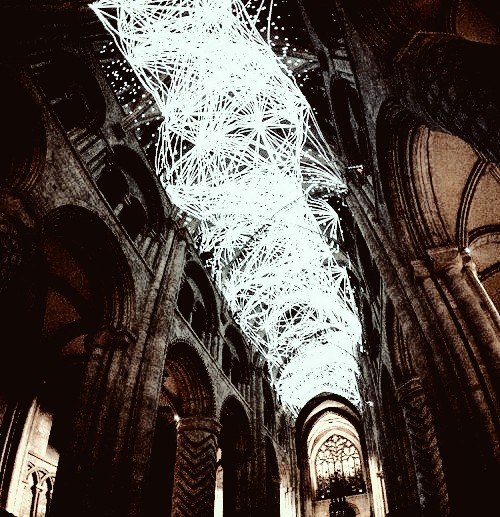
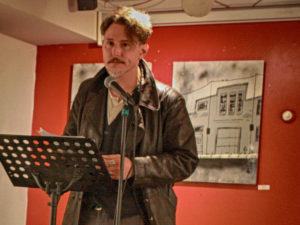
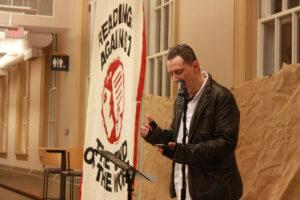
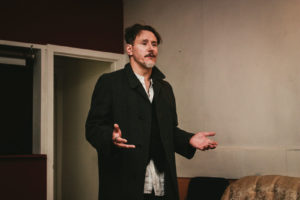

Very interesting and well done piece. I would add that part of the problem in the reduced importance of poetry in the USA (as a part of the mass communication world) is that the importance of a wide audience, of being intelligible to most people ceased to be valued by poets. There is a reason that Collins and Oliver have a wide following, as did Frost and Sandburg. Indeed Shakespeare was the ultimate crowd-pleaser! I would wager the people who come to hear the Arab poets/prophets understand their words. Thank you!